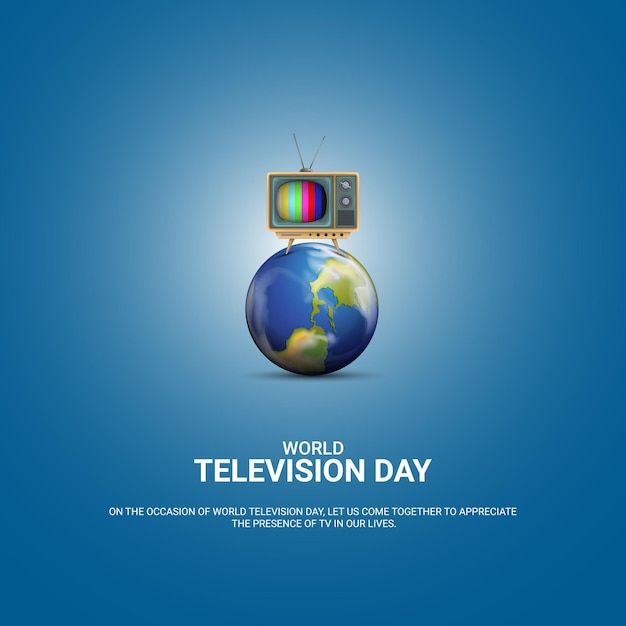“5 Powerful Reasons Why World Television Day Matters for Society”
All About World Television Day
World Television Day is observed every year on November 21st to celebrate the power of television as a medium of communication, entertainment, and education. It serves to acknowledge the profound influence television has had on the way we understand the world, share information, and even form our opinions. The day honors the medium’s capacity to shape public discourse, inform society, and bring global awareness to critical issues.
The day was proclaimed by the United Nations in 1996, following a recommendation made during the UN World Television Forum. The forum discussed how television, as a communication tool, has become an essential instrument for promoting peace, understanding, and international cooperation. Since then, World Television Day has been marked by events, discussions, and activities aimed at exploring the social, cultural, and political influence of television.
History of World Television Day
Television has come a long way since its inception. The first experimental television broadcasts began in the 1920s, but it wasn’t until the late 1930s that television technology became available to the public. The 1940s and 1950s saw a rapid expansion of television programming, with broadcasts becoming common in many households across the world.
The UN World Television Forum held in 1996 was a turning point in the recognition of television as a critical tool for communication. This event was aimed at highlighting the role of television in fostering dialogue, education, and cultural exchange. As a result, the United Nations decided to establish November 21st as World Television Day to celebrate this important medium. The day emphasizes not just the entertainment value of TV, but also its role in shaping modern society and promoting social change.
Significance of World Television Day
- Celebration of Television’s Influence: The most obvious reason for celebrating World Television Day is to recognize the immense impact that television has on society. It has shaped global culture, education, politics, and even the way people communicate with one another. Television provides a platform for people to express themselves, tell stories, and engage with others across the globe.
- Awareness of Television’s Role in Education: Television has been a crucial tool for education. Educational programs, documentaries, and instructional broadcasts have made information accessible to people around the world, regardless of location or socio-economic status. From nature documentaries to history lessons, television has proven to be an invaluable resource for learning.
- Global Connection: Television allows people to stay connected to world events, politics, and social issues. Whether it’s a breaking news report or a global sporting event, TV offers a front-row seat to the events shaping the world. On World Television Day, the global connection that television fosters is celebrated as a vital tool for international understanding and cooperation.
- Advancing Social Change: Television has also played a significant role in advocating for social change. Programs and documentaries have raised awareness about pressing issues such as poverty, inequality, climate change, and human rights. Television has been instrumental in fostering conversations about important societal matters and driving public action.
- Entertainment and Cultural Exchange: On a lighter note, television is a powerful source of entertainment. It provides people with countless hours of enjoyment, from dramas and comedies to reality shows and talk shows. It also acts as a cultural bridge, allowing individuals from different backgrounds to experience the diverse cultures, traditions, and viewpoints of people around the world.
Impact on Daily Life
In everyday life, television continues to be a central element of households worldwide. It influences what we think, how we see the world, and how we engage with others. Here are a few ways television impacts our daily lives:
- Education and Learning: Television programs have long been used as educational tools. From children’s shows to documentaries, they provide valuable knowledge on a wide array of topics, from science and nature to history and the arts.
- Cultural Influence: Television is a mirror of society and culture. Popular TV shows and movies often reflect societal values, trends, and concerns. For instance, TV shows can bring attention to important social issues such as gender equality or environmental conservation.
- Entertainment: Television offers countless forms of entertainment, from action-packed series to thought-provoking dramas, keeping people engaged and relaxed in their free time.
- News and Current Affairs: Many people rely on television as their primary source of news and updates on global events. Television networks provide real-time coverage of current affairs, political developments, and natural disasters, keeping society informed and connected.
Important Facts About World Television Day
- Date of Celebration: World Television Day is celebrated annually on November 21st.
- UN Recognition: The United Nations recognized World Television Day in 1996, emphasizing television’s role in fostering dialogue and understanding among cultures.
- Global Impact: Television is one of the most widely used communication mediums across the world, with billions of people tuning in to TV broadcasts every day.
- Television and Social Change: Television has played an essential role in highlighting issues such as human rights, climate change, and equality, making it a tool for activism and social change.
- Television’s Reach: In today’s digital age, television still holds a significant place, despite the rise of streaming platforms. TV continues to be a primary source of entertainment, news, and education for many people.
Frequently Asked Questions (FAQs)
1. Why is World Television Day important?
World Television Day highlights the important role that television plays in shaping society, fostering education, promoting social change, and connecting people across the globe. It recognizes television’s far-reaching influence in entertainment, communication, and education.
2. How can I participate in World Television Day?
You can celebrate by watching educational programs, attending screenings or discussions about the role of television in society, and engaging in social media campaigns that promote the positive aspects of television.
3. What role does television play in education?
Television provides access to valuable educational content, such as documentaries, news programs, and instructional videos, which help people learn about various subjects. It is especially useful in areas with limited access to other forms of education.
4. How has television changed over the years?
Television has evolved from black-and-white broadcasts to the high-definition, digital, and interactive platforms we see today. With the rise of streaming services and on-demand content, television continues to adapt to the needs of modern viewers while retaining its cultural relevance.
5. Is television still relevant in the age of digital media?
Yes, television remains relevant, though its form has evolved. Traditional TV broadcasts continue to coexist with digital streaming platforms, and many networks are transitioning to online streaming, ensuring that television remains a central part of people’s lives.
Wishing on World Television Day
On November 21st, we celebrate the incredible impact of television on our lives. May this day remind us of how far television has come and the positive influence it continues to have on shaping culture, educating the public, and promoting global unity. Here’s to the power of the screen, bringing the world closer together!
The Importance of World Television Day for Society
World Television Day is not just a celebration of television as a form of entertainment, but an acknowledgment of its broader influence on society. From education to social change and cultural exchange, television continues to play a pivotal role in shaping our world. This day encourages us to reflect on the power of this medium and its potential to connect, inform, and entertain people around the globe.










